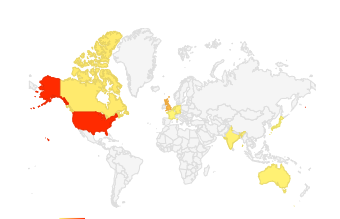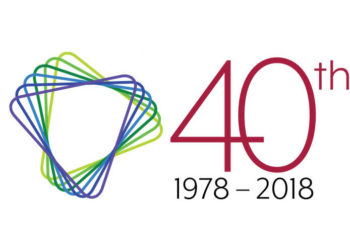Earlier this year, under the auspices of the Kitchen Cabinet (the Society for Scholarly Publishing [SSP] committee responsible for The Scholarly Kitchen), we carried out our first readership survey. Celebrating our tenth anniversary felt like a good time to reflect on how well we are meeting SSP’s goals for the blog, whether those goals need to be revisited, and what you, our readers, like — and don’t like — about the Kitchen. Many thanks to all 777 of you who responded, and especially to the 663 who made it all the way to the end of what was quite a long and complex survey! Over the past few weeks, the results have been presented to the Chefs, the SSP Board, and attendees at the 2018 SSP annual meeting. Now it’s your turn!
First, the high-level demographics. Respondents overwhelmingly identify as white (87%); the remainder identify as Asian or mixed/multiple (3% each), black (1%), or preferred not to say (6%). 61% identify as women, 34% as men; less than 0.5% identify as transgender or none of these options; and 4% preferred not to say. Both in terms of race/ethnicity and gender, therefore, respondents broadly reflect the makeup of our industry as shown in previous surveys, such as that from Digital Science/Fordham in 2015. Interestingly — and encouragingly — we have a great spread of readers across all career stages:19.5% of respondents are 26-35; 26.5% are 36-45; 25% are 46-55: and 18.5% are 56-65. Around 2% are 25 and under, 5.5% are 65 and older, the remainder chose not to provide this information.
Two thirds of respondents (66%) were from the US/Canada and 28.5% from Europe (including the UK), with tiny minorities from Asia (2%), Australasia (1.5%), Latin America (including Mexico) and Middle East/Africa (both less than 1%). This broadly reflects what we know of the Kitchen’s readership from the blog analytics (see map below).

In terms of where respondents work, universities — at 35% — were the single largest organization type represented, somewhat surprisingly given that The Scholarly Kitchen is primarily a scholarly publishing blog. Publishers (30%) and associations/charities/NGOs (15.5%) were the second and third most common workplaces respectively. Service providers (6%), consultants (4.5%), self-employed (3.5%), professional services (2.5%), and government (2%) made up the remainder, together with 1% for whom the question was not applicable. The two best represented job functions in the survey results by some way were editorial/publishing roles and librarians, each with around 29% of respondents. The other functions represented in the survey were communications/marketing (8%), sales/business development (7.5%), academics/researchers (7%), production/content management (4.5%), administration (4%), product development (3.5%), and technology (3%). The remainder answered not applicable.
Given that the survey was promoted directly to people who have registered to receive our alerts, as well as more broadly on the website and on social media, it’s not surprising that most respondents are regular readers (71% read the blog daily or 1-3 times weekly). Almost as many (68%) have been reading it for at least three years. Nearly one third (30.5%) of respondents can’t remember how they first learned about The Scholarly Kitchen; but, of those who do, half started reading the blog as a result of a colleague recommendation. The remainder learned about the blog via social media (10%), the SSP website (5.5%), or a web search (4%). Nearly two thirds (65%) get our email alerts, nearly one third (30.5%) follow the @ScholarlyKitchn Twitter account, and 15% follow one or more of the Chefs on Twitter. 8% are signed up for our RSS feed, 7% follow us via the SSP website, and 3.5% follow us on Facebook. (Note, respondents could select more than one choice for this question.)
Now to the really interesting stuff. First, let’s look at what you told us about The Scholarly Kitchen in response to questions such as: how well we are meeting SSP’s goals for the Kitchen — and whether they are still the right goals; whether the Chefs provide a good balance of opinions; and how well the Kitchen represents the people, organizations, and views of our industry.
Several themes emerged from your answers and comments. First, many of you feel strongly that there is a need for increased diversity — in all its forms (gender, race, geography, career level, organization type, job function, discipline, and more) — on the Kitchen. We’re clearly not doing as well as we should be at representing the people and organizations involved in scholarly publishing. Although, as one respondent noted:
I would like it to be more diverse in terms of age and ethnicity. However, I find that this represents SSP and really scholarly publishing at large… so I think the changes that need to be made extend far beyond TSK. However, I think there needs to continue to be a place for conversations about diversity and inclusion.
At best, you rated us 3.6/5 for representing the opinions of our community; at worst, just 2.66/5 for representing ethnic and racial diversity. And, while just over half of you feel that the current group of Chefs provides a good balance of opinions, nearly half of you (47%) say that we either somewhat or don’t do so. Many of the hundreds of free text comments also reflected this feeling, expressed well by this respondent to an open-ended question about whether there are other goals we should be addressing:
Engaging a wider range of opinions and people who are involved in scholarly publishing … Also the ‘chefs’ very much speak the same language which often ‘says little to me about my life’ and feels exclusionary.
This is an issue that we’ve already started to address, and one that SSP overall is also playing a leadership role in addressing. Hopefully you’ve noticed that we’ve been publishing many more posts recently about topics around , diversity, equity, and inclusion. We now have a Diversity & Inclusion Collection, with 10 posts on the topic published so far this year and more in preparation; some older posts have already been added, with more to come. We are also publishing many more guest posts: 19 so far this year — six more than in the whole of 2017. Not surprisingly, given your feedback, this content is popular! Some of the most viewed posts this year include the first of the two anonymous posts entitled “On Being Excluded:Testimonies by People of Color” (nearly 9,500 views at the time of writing); Alison Mudditt’s “Breaking the Silence: the #MeToo Moment in Scholarly Communication” (around 8,500 views); and another guest post, by Tasha Mellins-Cohen, “Childfree, Childless, and Childcare – They All Attract Bias in the Workplace” (over 5,000 views).
Another recurring theme was the need to publish more content by and/or for early career professionals, which can be used explicitly to help get those of you who are just starting out in scholarly publishing up to speed. Betsy Donohue’s recent guest post on the topic resonated with many of you. She had four main suggestions for us: 1) engage early career editors; 2) sign on more line Chefs; 3) mentor/mentee coverage; and 4) survey readers. I’m happy to say that we are making progress on implementing all of these. We’ve recruited a small group of early career professionals to join The Scholarly Kitchen specifically to help advise us on relevant topics and authors; they’ll be mentored by current Chefs. Watch for more on that initiative soon. As noted, we’ve already ramped up the number of guest posts, and plan to continue those. And, while we aren’t planning another survey immediately — since these results have given us plenty of food for thought — I expect that we will be asking you, our readers, for your views on the Kitchen more frequently in future.
Of course, ensuring that our community feels welcome and engaged in The Scholarly Kitchen isn’t just about being more inclusive in terms of our content and authors. It’s clear from your feedback that a number of you also find the tone of the Kitchen off-putting at times, particularly in the comments section. While nearly half of you who comment (47%) found the experience somewhat or very positive, 10% found it somewhat or very negative; 15% of you don’t comment in part because you feel intimidated by some or all of the Chefs; 20% don’t do so because you feel intimidated by some or all of the commenters. This quote sums up many people’s concerns:
… far too often the commenting spins into a morass of contentious jockeying rather than a healthy discussion of issues of value to the community. When you have the same set of commenters play over the same set of entrenched positions over and again it is very difficult to find a way into the conversation.
This is definitely an area where we need to do better, especially since one of SSP’s goals for The Scholarly Kitchen is: “Attract the community of experts interested in these things and give them a place to contribute”. The Kitchen Cabinet has been charged by the SSP Board to work with David Crotty (the Kitchen‘s Editor-in-Chief) to address these issues and we already have some ideas for how to do so. Again, watch this space for more!
Diversity, inclusion, balance, and respect all came up again when we asked you what you would change about The Scholarly Kitchen. Other issues raised here included the length and frequency of posts; the need to focus more on users including, ideally, more posts by researchers themselves; and a desire for more — and less (!) — of a focus on commercial publishing (so perhaps we have the balance right on that particular topic).
When asked what you like best about the Kitchen, the quality of authors and posts and the timeliness of posts were the most popular choices (23% each), closely followed by “It helps me understand perspectives other than my own” (20%) and the range of topics covered (19%). The vast majority of respondents (86%) find the blog somewhat or very valuable, and overall you gave us a Net Promoter Score* of 33. There were some lovely comments in this section including my own personal favorite from someone who appreciates our timeliness!
Y’all told me about Elsevier buying bepress before bepress did.
We also invited you to suggest topics and authors that you’d like to see featured in The Scholarly Kitchen in future, and were quite overwhelmed (in a good way) by the response. Over 250 comments, which we are still working our way through — thank you! Please also feel free to add other suggestions to the comments here, or contact David Crotty directly.
So, what next? For anyone interested in learning more, Roger Schonfeld is currently working on some more granular analysis of the survey — by demographics, length of readership, etc — which will be published later in the summer. In addition, the full, anonymized dataset is now publicly available (with the exception of your suggestions for future topics and authors, since many of those included personal information), for the community to view and use as you wish. And we warmly invite you to add any additional comments or feedback on the survey, the process, or the results here.
Thank you!
*We know the Net Promoter Score has its detractors, but we hope that by using it consistently it will help us track whether we are doing a better job of meeting SSP’s goals — and our readers’ needs
Discussion
11 Thoughts on "The Scholarly Kitchen at Ten: Results of our First Readership Survey"
I would think the demographic breakdown represents the US and Europe and is reflected in the editorial board makeup. Perhaps TSK should broaden its editorial board and seek an editor from China, Japan, and India or at least contributions. It would be interesting to read perspectives from the newly emerged scientific world.
Hi Harvey, I think I can say on David’s behalf that we would love to add chefs from other parts of the world. As mentioned, we did receive a lot of great recommendations including a number of suggestions for writers from outside of the US/Europe, so hopefully some of those will work out. And if anyone wants to volunteer, please do let us know! Thanks
Thanks Alice, a great summary, and wonderful to see the Scholarly Kitchen and SSP being proactive getting reader feedback and looking closely how the Kitchen may develop and evolve over the next 10 years.
Having written a few guest posts, I’d also like to say a big thanks to all the Chefs and Guest Chefs who write and take time to contribute posts, I know it’s no small task writing and preparing a post, so a hearty thanks for all the contributors, TSK really is a great resource. Here’s to the next 10 years !!
“In terms of where respondents work, universities — at 35% — were the single largest organization type represented, somewhat surprisingly given that The Scholarly Kitchen is primarily a scholarly publishing blog.” Could this be because a number of respondents work at university presses? I don’t recall what the options were for this question.
Yes that’s possible – though there were also a lot of responses from librarians, most of whom probably work at librarians. We will have better answers to these sorts of questions when Roger has completed the next round of analysis!
Thanks Alice. I thought the same thing about librarians as soon as I made my comment about UP employees. I look forward to hearing more about the survey as you and others sift through the details.
Although I am a daily reader of SK I do find that many (if not most) posts are really for people involved in scholarly journal publishing rather than in scholarly book publishing. Maybe that is just my limited perspective, but I am wondering if the data dive will give us more information about how many of us work in book publishing rather than journal publishing and whether it matters in terms of the subjects of posts?
Apologies for my slow response, Roy – and yes this point was made by a number of people, both explicitly and in the context of improving our coverage of non STEM disciplines. We hope to address this in the coming months and, as always, please do suggest specific topics and/or writers!
thank you. I think somebody from the Latin American community would be very welcome as a frequent writer and commentator because it is utterly different to the anglophone system. There, universities and scholarly organisations do most of their own publishing and mostly using meager state funding. Most journals and many books are completely open access.
I do not get email updates and not on Twitter so I did not know about the survey.
My preoccupation is almost entirely with breaking the power of the major publishing companies that are stitching up University academics and library budgets and increasingly taking over and dominating the industry. This is a moral position that is not always shared on the blog .
Apologies for my late response Simon – we would love to include more writers from and posts about the Latin American publishing community. You’re doing some really interesting stuff, including through organizations like Redalyc and SciELO, and I know I’m not alone in wanting to learn more. As mentioned, please do suggest writers and/or topics for us to follow up on and thank you!



